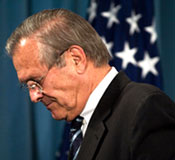JIM.LOBE
- The anti-war movement has failed (Voltaire, 02-23-2006)
- Active-duty troops say it’s time to get out of Iraq (FCN, 11-14-2006)
- New consensus emerges on Iraq–we were wrong (FCN, 11-07-2006)

WASHINGTON (IPS/GIN) – The abrupt replacement of Pentagon chief Donald Rumsfeld by former Central Intelligence Agency director Robert Gates, combined with the Democratic sweep in the recent mid-term elections, appears to signal major changes in United States foreign policy, particularly in the Middle East.
With the Democrats gaining at least 29 seats to win a secure majority in the House of Representatives and appearing poised to win a narrower majority in the Senate as well, both Vice President Dick Cheney and his neo-conservative supporters now appear more marginalized than ever.
“If the trend in the Bush second term is viewed as what a friend of mine once called ‘an imperceptible 180-degree turn’ from neo-con ideology to political realism, then this would be a crowning achievement,” says Gary Sick, an Iran specialist at Columbia University who worked with Gates in the National Security Council under former president Jimmy Carter.
“I think this is one of the most significant U.S. policy shifts in the past six years,” he said, adding that, among other things, Mr. Rumsfeld’s departure and Mr. Gates’ ascension would, at the very least, give Secretary of State Condoleezza Rice more diplomatic maneuvering room than in the past when she had to contend with both a hostile vice president and a secretary of defense.
The quagmire in Iraq for which Mr. Rumsfeld was, of course, one of the most visible actors was, according to both the pre-election and exit polls, probably the single-most important factor in what President George Bush called a Republican “thumping.”

“At a minimum, Rumsfeld’s departure buys the President time to adjust Iraq and other policies without the newly empowered Democrats screaming for blood,” opines Chris Nelson, editor of the private insider newsletter, The Nelson Report.
In his first post-election statement, Pres. Bush vowed to find “common ground” with the Democrats on Iraq, as well as other issues–a promise that seemed inconceivable just a month ago when he and V.P. Cheney were accusing the opposition party of wanting to “cut and run” from Iraq and handing the “terrorists” there a great victory.
For their part, the new Democratic leadership–House Speaker Representative Nancy Pelosi and the likely majority leader Senator Harry Reid–called for a national summit on Iraq policy.
While the Democrats seem united on Iraq, many, if not most, including Rep. Pelosi, believe that Washington should begin “redeploying” the 140,000-plus troops from Iraq and setting timetables for an eventual withdrawal over the next one to two years in order to reduce the mounting costs in blood and treasure of the U.S. intervention, extricate Washington from what appears to be a growing sectarian civil war, and put pressure on the Iraqi government and its various factions to prevent one.
Both parties are likely now to defer to the recommendations of the Iraq Study Group (ISG), a bipartisan, Congressionally appointed task force co-chaired by former secretary of state James Baker and former House Foreign Affairs Committee chairman Lee Hamilton, which is supposed to release its report between now and early next year.












